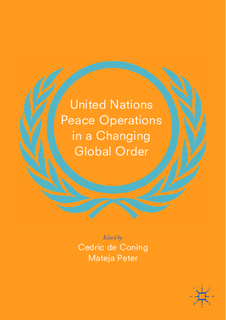| dc.contributor.editor | De Coning, Cedric | |
| dc.contributor.editor | Peter, Mateja | |
| dc.date.accessioned | 2018-10-23T13:13:41Z | |
| dc.date.available | 2018-10-23T13:13:41Z | |
| dc.date.created | 2018-10-15T16:51:59Z | |
| dc.date.issued | 2019 | |
| dc.identifier.isbn | 978-3-319-99105-4 | |
| dc.identifier.uri | http://hdl.handle.net/11250/2569176 | |
| dc.description.abstract | This edited volume generates a discussion about UN approaches to peace by studying challenges and opportunities that the organisation is facing in the 21st century. We use some of the findings from the HIPPO report as an inspiration and put both its recommendations and broader UN actions in a wider context. We identify four transformations in the global order and study what implications these have on UN peace operations. The first two transformations emanate from the changing relations between states and reflect the increasingly multipolar character of contemporary global governance. The latter two transformations reflect the changing relations between state and non-state actors. These two broad groups of non-state actors are fundamentally incompatible in their outlook on how and whether the international community should be intervening. That notwithstanding, both groups of non-state actors also force the UN and its member states to rethink the centrality of state-based approaches to security and intervention. In this volume, we identify four transformations in the global order and study their implications on the United Nations peace operations. We ask: - How is the rebalancing of relations between states of the global North and the global South impacting the UN’s decision-making, financing and ability to design operations that go beyond the minimum common denominator; - How is the rise of regional organisations as providers of peace impacting the primacy of UN peace operations and how and whether the UN can remain relevant in this era of partnership and competition; - How have violent extremism and fundamentalist non-state actors changed the nature of international responses and what does this mean for previously advanced longer-term approaches to conflict resolution; - How are demands from non-state actors for greater emphasis on human security impacting the UN’s credibility, and whether, in light of the first three transformations, is the UN even able to prioritise people-centred approaches over state-centred ones. Our core finding is that with the entry of new actors from the global South as important players in the peace arena, we seem to be entering a more pragmatic era of UN peace operations. As contributions to this volume show, there is a greater willingness to innovate and experiment with new forms of conflict management, including more robust interpretations of UN peacekeeping and an increasing reliance on regional actors as providers of peace. At the same time, the UN is facing a classic struggle between the promotion of liberal international norms and realist security concerns. The resolution of this struggle is less clear. The contributors to this volume emphasise the importance of people-centred approaches, conflict sensitivity and longer-term thinking as key aspects to continued relevance of the UN, but their conclusions as to how achievable these are by the UN are not as clear cut. | nb_NO |
| dc.description.abstract | United Nations Peace Operations in a Changing Global Order | nb_NO |
| dc.language.iso | eng | nb_NO |
| dc.publisher | Palgrave Macmillan | nb_NO |
| dc.relation.uri | https://link.springer.com/book/10.1007/978-3-319-99106-1#toc | |
| dc.rights | Navngivelse 4.0 Internasjonal | * |
| dc.rights.uri | http://creativecommons.org/licenses/by/4.0/deed.no | * |
| dc.subject | FN | nb_NO |
| dc.subject | UN | nb_NO |
| dc.subject | Fredsbevarende operasjoner | nb_NO |
| dc.subject | Peacekeeping | nb_NO |
| dc.subject | Terrorisme | nb_NO |
| dc.subject | Terrorism | nb_NO |
| dc.subject | Fredsbygging | nb_NO |
| dc.subject | Peace-building | nb_NO |
| dc.title | United Nations Peace Operations in a Changing Global Order | nb_NO |
| dc.title.alternative | United Nations Peace Operations in a Changing Global Order | nb_NO |
| dc.type | Book | nb_NO |
| dc.description.version | publishedVersion | nb_NO |
| dc.rights.holder | © The Editor(s) (if applicable) and The Author(s) 2019. This book is an open access publication. Open Access This book is licensed under the terms of the Creative Commons Attribution 4.0 International License (http://creativecommons.org/licenses/by/4.0/), which permits use, sharing, adaptation, distribution and reproduction in any medium or format, as long as you give appropriate credit to the original author(s) and the source, provide a link to the Creative Commons license and indicate if changes were made. The images or other third party material in this book are included in the book’s Creative Commons license, unless indicated otherwise in a credit line to the material. If material is not included in the book’s Creative Commons license and your intended use is not permitted by statutory regulation or exceeds the permitted use, you will need to obtain permission directly from the copyright holder. | nb_NO |
| dc.subject.nsi | VDP::Internasjonal politikk: 243 | nb_NO |
| dc.subject.nsi | VDP::International politics: 243 | nb_NO |
| dc.source.pagenumber | 334 | nb_NO |
| dc.identifier.cristin | 1620396 | |
| cristin.unitcode | 7471,13,0,0 | |
| cristin.unitname | Fredsoperasjoner og sikkerhetsreform | |
| cristin.ispublished | true | |
| cristin.fulltext | original | |
| cristin.qualitycode | 2 | |

